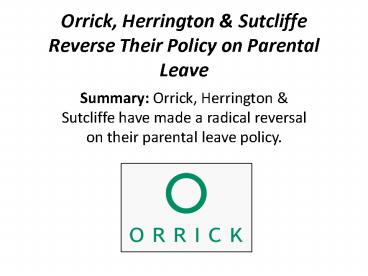Orrick, Herrington & Sutcliffe Reverse Their Policy on Parental Leave - PowerPoint PPT Presentation
Title:
Orrick, Herrington & Sutcliffe Reverse Their Policy on Parental Leave
Description:
Orrick, Herrington & Sutcliffe have made a radical reversal on their parental leave policy. – PowerPoint PPT presentation
Number of Views:7
Title: Orrick, Herrington & Sutcliffe Reverse Their Policy on Parental Leave
1
Orrick, Herrington Sutcliffe Reverse Their
Policy on Parental Leave
- Summary Orrick, Herrington Sutcliffe have made
a radical reversal on their parental leave policy.
2
This article first appeared on BCGSearch, BCG
Attorney Search is widely known to be the most
selective recruiting firm in terms of who it
represents in the United States. In addition, BCG
Attorney Search is the most demanding of its
recruiters and is widely considered to be the
most rigorous recruiting firm in terms of
screening our recruitment staff. As is not too
uncommon in the business world, Orrick,
Herrington Sutcliffe have made a radical
reversal on their parental leave policy. Formerly
against Ellen Pao in a gender discrimination
suit, they have felt the general dissent of the
world looking on, and decided to reverse the
things that went before.That's why as of May 1,
their lawyers can expect an eligibility of 22
weeks of paid leave and nine months of job
protection, an increase of four weeks paid and
two weeks unpaid leave to their prior policy. A
smooth way to appease their critics. In their
explanation of why they are doing this, the firm
noted that women account for 47 percent of law
graduates, but only 17 percent of equity
partners. According to a 2007 report by M.I.T.,
the explanation is to be found in women's
propensity to become mothers.
3
Women do not become partners because "the
difficulty of combining law firm work and caring
for children in a system that requires long hours
under high pressure with little or inconsistent
support for flexible work arrangements" makes it
too hard.So the hours are crap, the demands are
high, and the only way to get young mothers to
succeed in this nonsense is to ease up on the
expectations. Which is what Orrick, Herrington
Sutcliffe are doing.In questioning this
narrative, we might wonder why young mothers
should be succeeding in this capitalistic
contrivance of 60 to 70 hours a week lawyering to
make money for the rich, or how getting equal
numbers of women and men in such positions would
count as any sort of success for those hoping to
secure women's rights. There is also the business
of human rights in general, and what it means to
be a human being in today's global economy.
4
For the so-called "millenials," those under 30,
"Firms should know that the millennials have no
interest in making work / family trade-offs. They
look at the sacrifices the generations above
them, even their own parents, have made, and
reject this path fully," as professor Kellie
McElhaney, founding director of the Center for
Responsible Business at Berkeley-Haas School of
Business, told Mitch Zuklie, Orrick Chairman and
CEO, in a recent conversation. "Before making job
choices, millennial couples specifically discuss
and consider together, their ability to share
equally child-reading responsibility. To be
clear, this is not an indication that young
female professionals are less ambitious to make
it to the top ranks. This is an indication that
they expect their male partners and their
employers to help support this success."Why
child-rearing responsibilities should be "equal"
rather than partitioned bespeaks the rhetoric of
equality so dominant in today's dialectic. That
some partners require "help supporting their
success" while others do not bespeaks more of the
same. Whatever the case, Orrick knows which way
the wind blows, and so has overhauled their
parental leave policy to make it all come
together in a manner looking to be the cutting
edge in the field.































